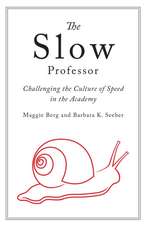Survival of the Fittest: The Shifting Contours of Higher Education in China and the United States: New Frontiers of Educational Research
Editat de Qi Li, Cynthia Gerstl-Pepinen Limba Engleză Hardback – 16 dec 2013
| Toate formatele și edițiile | Preț | Express |
|---|---|---|
| Paperback (1) | 636.12 lei 43-57 zile | |
| Springer Berlin, Heidelberg – 27 aug 2016 | 636.12 lei 43-57 zile | |
| Hardback (1) | 642.18 lei 43-57 zile | |
| Springer Berlin, Heidelberg – 16 dec 2013 | 642.18 lei 43-57 zile |
Din seria New Frontiers of Educational Research
- 20%
 Preț: 575.18 lei
Preț: 575.18 lei - 20%
 Preț: 561.11 lei
Preț: 561.11 lei - 20%
 Preț: 581.94 lei
Preț: 581.94 lei - 15%
 Preț: 660.49 lei
Preț: 660.49 lei - 15%
 Preț: 644.18 lei
Preț: 644.18 lei - 15%
 Preț: 639.90 lei
Preț: 639.90 lei -
 Preț: 386.22 lei
Preț: 386.22 lei -
 Preț: 387.07 lei
Preț: 387.07 lei - 15%
 Preț: 643.65 lei
Preț: 643.65 lei - 18%
 Preț: 951.77 lei
Preț: 951.77 lei - 15%
 Preț: 647.92 lei
Preț: 647.92 lei - 18%
 Preț: 729.84 lei
Preț: 729.84 lei - 15%
 Preț: 657.25 lei
Preț: 657.25 lei - 18%
 Preț: 887.55 lei
Preț: 887.55 lei - 18%
 Preț: 731.10 lei
Preț: 731.10 lei
Preț: 642.18 lei
Preț vechi: 755.51 lei
-15% Nou
Puncte Express: 963
Preț estimativ în valută:
122.88€ • 128.64$ • 101.68£
122.88€ • 128.64$ • 101.68£
Carte tipărită la comandă
Livrare economică 07-21 aprilie
Preluare comenzi: 021 569.72.76
Specificații
ISBN-13: 9783642398124
ISBN-10: 364239812X
Pagini: 220
Ilustrații: XVII, 187 p. 2 illus.
Dimensiuni: 155 x 235 x 17 mm
Greutate: 0.47 kg
Ediția:2014
Editura: Springer Berlin, Heidelberg
Colecția Springer
Seria New Frontiers of Educational Research
Locul publicării:Berlin, Heidelberg, Germany
ISBN-10: 364239812X
Pagini: 220
Ilustrații: XVII, 187 p. 2 illus.
Dimensiuni: 155 x 235 x 17 mm
Greutate: 0.47 kg
Ediția:2014
Editura: Springer Berlin, Heidelberg
Colecția Springer
Seria New Frontiers of Educational Research
Locul publicării:Berlin, Heidelberg, Germany
Public țintă
ResearchCuprins
Preface.- Dedication.- Part One: Markets, Competition, and Strategic Change in Higher Education.- Chapter 1: Wolverton: Creating Creative Creators: China and the United States’ Common Quest.- Chapter 2: Lane & Owens, Fostering Economic Competitiveness in China and the US: Untangling the Web of Competing Regulations and Interests.- Chapter 3: Zha & Lin, China’s Move to Mass Higher Education: Analyzing the Policy Execution with a “NATO-Scheme”.- Chapter 4: Powers, Conflict of Interest and U.S. University Technology Licensing.- Part Two: Strategies Used to Address Core Issues in Higher Education.- Chapter 5: Li, Beyond Summative Evaluation: Improving the Quality of Teaching and Learning in China’s Higher Education.- Chapter 6: Pepin, The Dilemma of Assessment in the U.S..- Chapter 7: Claussen, The Evolving Role of the Ombudsman in American Higher Education.- Chapter 8: Kezar & Gerke, Grassroots Leadership: Responding to Declining Shared Governance in the Neoliberal World.- Part Three: New Directions and Future Possibilities.- Chapter 9: Cook, Professional Development for Chinese University Leaders: Collaboration, Not Competition.- Chapter 10: Mok, Transforming from “Economic Power” to “Soft Power”: Transnationalization and Internationalization of Higher Education in China.- Chapter 11: Mina, Strategic Planning: Devising the Way of U.S. Higher Education Institutions.- Chapter 12: Gerstl-Pepin, The False Promise of Market-Based Conceptions of Human Capital: Higher Education as a Public and Private Good.
Textul de pe ultima copertă
This book will examine how universities in China and the US are responding to markets and increasing global competition. For both countries, a university education is seen as key to economic development. While China and the US have two very different political systems, they represent the two largest economies in the world and share beliefs that higher education plays an integral role to economic development. The book will bring together scholars with multiple perspectives on the topic to create dialogue around similarities and differences. This book will appeal to students, scholars, and higher educational administrators in both countries and other countries as well who are seeking to understand the strategic change in higher education in both China and the US.
Caracteristici
A contracts between the strategic change in China’s higher education and that in US higher education Strategies used to address core issues in the two higher education systems New directions and challenges for their future ? Includes supplementary material: sn.pub/extras







